Jennifer K. Dick's Blog, page 2
October 2, 2023
Coming Up Conference Talks Oct and Nov 2023 on Jennifer Calkins, Christian Bök and Philippe Beck
Please join me for 3 forthcoming conferences:
I) At this first, I will be addressing the geography and mapping of California in the work Fugitive Assemblage by Jennifer Caulkins (but also in terms of Eleni Sikelianos' The California Poem).
Borders in the English-Speaking World: Mapping and Countermapping

Colloque international organisé par l’UR SEARCH
9-10 octobre 2023
Horaire : 9h-soir
Lieu : Université de Strasbourg, MISHA (Maison interuniversitaire des sciences de l’homme – Alsace)
FULL PROGRAMME at: https://search.unistra.fr/agenda/evenement/colloque-international-search-borders-in-the-english-speaking-world-mapping-and-countermapping
Abstract for my talk, which will take on OCT 10th at 10h30 in Session 4, in "Salle de la table ronde", at the MISHA
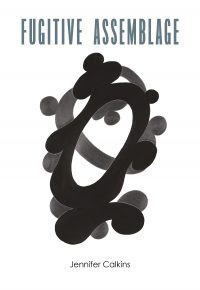
"De-or re-routingCalifornia in Fugitive Assemblage by Jennifer Calkins"abstract by Jennifer K Dick
MdC, Université de Haute Alsace,Mulhouse
Labo de recherche : ILLE,membre de SAES
Mapping loss, ancestral historyand the self onto the backbones of California: the roadways, no-tell motels,tourist sites and natural landscapes that surround and are embedded in the bodyand history of the speaker, Fugitive Assemblage (the 3rdthing, Washington, 2020) is a work both deconstructing and reconstructing selfand geographic (s)place. What makes us whole? What tears and rends us? Calkin’sfragmented, collaged (including specific geographical maps) road-trip, whichintended to go straight up the 105, takes a detour and thus maps, accidentally,the state onto the event haunting this story. Or rather, it is the map of placethat makes this story about a rending from a whole. It asks what is native/whois native of a place? What is place over time? What borders are we allowed totraverse in what directions (north-south into and out of Mexico, south-north asa questionable return)? This talk will explore the intimate lineage of selfand place as it is mapped and as the map is followed and detoured from in Calkin’sunusual “assemblage”. Is the author scrambling the maps of California, orrather, in her own search for clarity, straightening the lines and the lineagesof space and place back into place? Can we map our way home? Are maps redrawnby personal trips and the order we follow the lines of a place? Where donavigation and mapping collide? This talk will be informed by selectcomparisons to Eleni Sikelianos’ book length work The California Poem(Coffee House Press, 2004) which is in its own way a topographical map of thestate. These literary maps are a form of counter-mapping demanding explorationin the context of a conference on mapping and counter-mapping such as this one in Strasboug.
________________________________________________________________________________
2) I will be part of the Table Ronde on poetry (giving voice to authors such as Christian Bök and others) closing the "Microscopie Imaginaries" journée d'étude organised by JE at la Sorbonne Nouvelle (Paris III) on 24 Nov 2023: https://biocriticism.hypotheses.org/microscopic-imaginaries-conference
“Microscopic Imaginaries in 20th- and 21st-Century Literature”
Salle Athéna, Maison de la Recherche, 4 rue des Irlandais 24/11/2023

Organisers: Sarah Bouttier, Liliane Campos, Caroline Pollentier and Sarah Montin
9h Morning Session with: Patrick Armstrong (Cambridge): “Micro-Modernism” , Emma Felin (Oxford): “Microscopic Modernism” & Lisa Mullen (Cambridge): “‘News from the World of Neglected Dimensions’: War, fascism, and literature in Hugh Nicol’s Microbes by the Million (1939)”
Morning Round-table on “Microscopic Imaginaries in Popular Science”, with Cécilia Bognon-Küss (Sorbonne Université), Fleur Hopkins-Loféron (Sorbonne Nouvelle) and Liliane Campos (Sorbonne Nouvelle)
12h45 Lunch
14h15 Afternoon Session with: Teun-Joshua Brandt (Groningen): “Seeing the Unseen: Deep-Sea Microbes and the Ecological Imagination in Frank Schätzings Der Schwarm”, Rosalind Crocker (Cambridge): “Gothicising the Microbial ‘Other’ in Anne Roiphe’s An Imperfect Lens (2006)”, Shannon Lambert (Ghent): “Stuck in the Mud: Friction, Microbial Networks, and Citizen Science in Susan Gaines’ Accidentals (2020)”, Marco Caracciolo (Ghent): “Unraveling Bodies and Environmental Challenges in Contemporary Anglophone Fiction”
Afternoon Round-table on “Microbiology in Poetry”, with Sarah Bouttier (Polytechnique), Jennifer K. Dick (Université de Haute Alsace), Dorothy Lehane (Litmus Publishing) and Catherine Larose (Institut des Géosciences de l’Environnement)
__________________________________________________________________________________
3) I will also be giving an academic talk in French at "Philippe Beck, une autre clarté" qui aura lieu les 28, 29 et 30 novembre prochains à l'université Paris Cité.
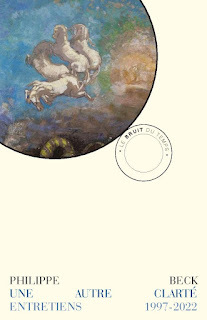
Watch for more information on that 3-day conference.
June 28, 2023
How Contemporary Poets Use Science Today
Jennifer K Dick proposes 5 categories for the ways in which contemporary poets are using science today :
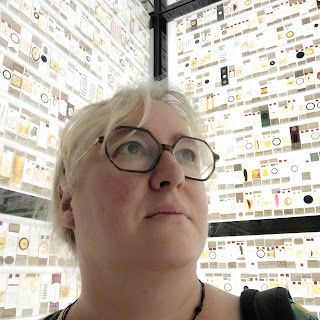 (this list is a sketch of only a fewexamples which I am sharing here as an invitation to others to think about this and other ways poets now or poets you know or you as poets are using science in your work. This list was compiled in 2017, so has not been updated)
(this list is a sketch of only a fewexamples which I am sharing here as an invitation to others to think about this and other ways poets now or poets you know or you as poets are using science in your work. This list was compiled in 2017, so has not been updated)1) Asmetaphor or exploration of language to name with precision
a. Stratification/use of combiningwords, images, metaphors & scientific concepts with colloquial/everydaylanguage—all the books in this handout fit here, too, but these are additionalones that really rely on this technique:
Archipelago, Arthur Sze
In Memory of My Theories, Rod Smith
Reproduction of Profiles, Rosmarie Waldrop
Norma Cole’s works— especially Spinozain Her Youth, but also Metamorphopsia
Etym(bi)ology (Omnidawn, 2002) by LizWaldner
Perhaps the origin ofthis is derived from Gertrude Stein’s explorations. As Kimo Reder explained in The arc of our ark: Bio-poetics over the DNA rainbow, http://jacket2.org/commentary/arc-our-ark « Gertrude Stein’s experiments in grammar, using a non-ritual repetition topressure units of language out of their assumed, denotative meaning, bombardeda word’s semantic nucleus and rendered it capable of new syntactic mutations.Similarly, bio-poetics play on the protean complexity of subvisible microbesand their dizzying variety of ontological admixtures. In one such work, “ewe”as sheep plays on “you” as pronoun and palindromically gestures toward ourbestial past and post-species future at once. »
b. Nature/body metaphor; biology andmicrobiology and the science (i.e. uses of litmus paper, etc) as metaphor or asan answer to “Oh yes, we have words for all this” (Dorothy Lehane, Ephémeris,22) is prevalent in works by numerous authors, including—
Ephemeris, Dorothy Lehane(editor of Litmus magazine, UK)
Dummy Fire, Sarah Vap
Tender Girl, Lisa Samuels (above all explored through a biological transformation)
Ban en Banlieue by Bhanu Kapil: “I wanted towrite a novel but I wrote this [Hold up charcoal in fist.] I wrote the organsweets—the bread-rich parts of the body before it’s opened then devoured. Iwrote the middle of the body to its end.” (19)
And on a lesser level, in combination with questions about language andthe world as iis/describable, explorable:
Facts For Visitors, Srikanth Reddy
Bravura Cool, Jane Lewty
Gender City and Anti M by Lisa Samuels
2) tospeak about illness—either literally or metaphorically (for example, where manbecomes the virus which is an infection/plaque upon the earth)
a. Body/illness (&death)—
Tory Dent, HIV, Mon Amour
Schizophrene Bhanu Kapil
Pneumatic Antiphonal, Sylvia Legris
Post-stroke, Juliet Cook
Also An Essay in Asterisks byJena Osama, but her other works may be stronger examples to look at.
Ban en Banlieue by Bhanu Kapil: Politics and the injured/sickened body: violenceagainst the body that stems from a political event, enters the body, itsbiology, transforms it: “The roar of the race riot dims. Ban is crumpled like atulip: there. A wetness, that is, with limbs. There are subtle movements:ventral and dorsal (muscular) twitches. This is the sensorimotor sequence. Thisis voltage: the body routed through its sounds: groans, murmurs, shouts.” (48)—inher end-notes, she thanks Sarah Roder for conversations on cranial-sacralbodywork which led to Bhanu’s twitching descriptions (see p 87 of the book)
Technical terms and unpacking them for schizophrene: “For years now, I’ve beenthinking about schizophrenia and disgust. How the capacity of a schizophrenicto recognize disgust in another person’s face, the person looking at them, isactually the thing that is workable. You can train the schizophrenic torecognize other facial expressions based on their ability to recognize thatone. Anhedonia, for example, the negative symptom of schizophrenia, is ‘theabyss between sentences,’ as Gaill Scott writes. Decontextualized.” (58)
b. Man as infection ofworld :
The Xenotext book 1, Christian Bök
Juliana Spahr Transformation
Brenda Iijima, Around Sea
3) To explore nature/biology & human interactions
a. In ecopoetic works: (too many to list, but here is a random taste of some I like)
Brenda Iijima, esp Around Sea & her most recent book onanimals
Gale Nelson, Ceteris Paribus
Gale Scott’s poems and writings on Schizophrenia
Tender Girl, Lisa Samuels
The Xenotext book 1, Christian Bök (& the ongoing project)
Juliana Spahr’s The Transformation,using biology and in particular the plant “themaracujá vine” : passiflora use and discovery by a Dr in 1569 in Hawaii toparallel the experiences of the immigrant arriving on that island & issuesof infection— questions of understanding what they were on a political and racelevel (related to biological origin differences) mixes with politics andextinction level event fears (flus, but then this becomes a 9/11 book in whichshe develops the issues already present in her poetry collection This Connection of Everyone With Lungs and thus explores the issue of what is carried onthe air and breathed into the body, even from afar.)
3 books by Thalia Field, all at New Directions: Bird Lovers, Backyard; Point& Line ; Incarnate: StoryMaterial
Schizophrene, Bhanu Kapil
Ban en Banlieue, Bhanu Kapil: “Adornosubstituted people for animals; I feel cautious and sad reading his words inthe middle of the night, studying the body for Ban. /// Why?// To ‘reduce theliving body.’ [E. Groz].///To reach the point at which: ‘life rubs up againstmatter, its inner core.’ And thus to analyze nudity in a text, as friction, thesacrifice gone wrong: but also: the normalizing contact with membranes of allkinds—plant, brush, nettles, ivy, asphalt, skin. What is the function of anon-genital nudity in a work of narrative? How can the body perform somethingin a new way—something that belongs neither to the scene nor to history? Notefrom the labyrinth: 2.b.”(59)
b. EXTINCTION OF SPECIES: (and of humans as well)
Thalia Field, Bird Lovers,Backyard
Juliana Spahr, The Transformation
TheXenotext book 1, Christian Bök. DLuman explains in his book review: “One of the hinges of the textis a 52-part section that translates a part of Virgil’s Georgicsentitled “Colony Collapse Disorder” which makes an allegory out of Virgil’smetaphor of armies to bees, drawing a parallel to the fragile state of beepopulations in our real, extra-textual world—a kind of damage that we, asbiological beings, have enacted on other biological beings largely through theproduct of systems of action brought into being by our own will in language. Itis a conflict that, no matter how developed our concepts of meaning andsignification become, condemns genetic structures to die; no amount of languagecan resurrect species subject to the forces of extinction or answer thequestion, as Bök’s translation asks, // [h]ow do we expiate our sins havingsacrificed every beast upon every altar?” (in Found Poetry Review, Douglas Luman, http://www.foundpoetryreview.com/blog/book-review-the-xenotext-book-1/ )
c. Cyborg identity—the body (biological),the hybrid body and the mechanical body: A.I.
Bhanu Kapil Incubation : ASpace for Monsters
Jacques Sivan: Notre Mission (Al Dante/Presses du Réel, 2018)
Edging, Michelle Noteboomas well as her chapbook « The Chia Letters »
4) Work which is in the service of science—for a better understanding ofscience :
The Xenotext book 1, Christian Bök
Pneumatic Antiphonal, Sylvia Legris
Allthe books by Amy Catanzano
Darwin: A Life in Poems, Ruth Padel
Mad Science in Imperial City, ShanxingWang
Ina way, all of the works by Mari-Lou Rowley
Juliana Spahr : This Connection of Everyone With Lungs& Transformation
The Character, Jena Osman & herhypertext work: The Periodic Table
5) As « biosemiotic » explorationof the world:
Most of these books also tend topose numerous questions about the nature of the self through a sort ofbiosemiotic exploration of the world. The philosophical question « who amI » / “who are we” ? encounters potential responses or metamorphosesinto an alternative query : « What are we » ?
Mari-Lou Rowley is actively implicated in this kind of exploration. Shewrote on her blog that she was « struckby […] thebiosemiotic tango of all living things in and within the dynamic flux ofchanging environments.” And she goes on to explain that “As an eco-science poetwho has tumbled, quite gleefully, into the field of biosemiotics the questionsthat compel me are: What is the nature of poetic and/or creative emergence?What is the zygote and epigenisis of a poem or work of art? How does the poetread and interact with her environment, or semiosphere, in order to translateemotions, memories, sounds, smells, disconnected images, into the phonemes,syllables, words, lines and stanzas of a poems that resonates with thereader/listener. By what mechanisms does a poem or artwork evoke emotional orphysiological response? Both Tammy and I believe in the concepts behindbiosemiotics. Of course molecules, organisms and animals (human and non-human)communicate in and with the environment. We hear them. We are constantly on thelookout for signs.
The genesis of art, poetry andbiological process involves multiple pathways and signals—which involves bothan element of chance and of choice. (Transforium– notes on process; Posted on November 23,2012 by Mari-Lou Rowley)
Ina reversal which poses the questions who and what are we—are we biology or man,we can add the experiment and the project The Xenotext by Christian Bök.In The Xenotext, July 5, 2011, http://arcade.stanford.edu/blogs/xenotext, Allison Carruth wrote: “The Xenotext Experiment aims to create a procedurefor the reciprocal, meaningful translation of poetry into DNA and DNA intopoetry. // In his 2008 description of the project, Bök writes "Not simplya code that governs both the development of an organism and the maintenance ofits function, the genome can now become a vector for modes of artisticinnovation and cultural expression.” A future of ecological collapse underliesthis techno-lyrical project. Bök goes on to cite cybernetic theorist Pak Wong'sview that the use of DNA to encode messages in the highly resilient and adaptivecells of bacteria could serve to store cultural heritages “against planetarydisaster.” How and who would later decode those messages—first written inAmerican Standard English and then translated into a DNA sequence, in Bök’sproject—is a question we should certainly raise.
[…] Akin to bioartist Eduardo Kac, Bök claims that the genomeis today a foundation "for heretofore unimagined modes of artisticinnovation and cultural expression.” In turn, he suggests, “poetry standspoised to become the conduit for life science research.”
June 18, 2023
THE FOURS by Barbara Beck Jennifer K Dick Michelle Noteboom and Lisa Pasold
The Fours: out today!
 The 8th, and newest, chapbook in the collaborative 8-hand series by Barbara Beck, Jennifer K Dick, Lisa Pasold and Michelle Noteboom.
The 8th, and newest, chapbook in the collaborative 8-hand series by Barbara Beck, Jennifer K Dick, Lisa Pasold and Michelle Noteboom. We shall brunch-read in celebration of this very YELLOW thus bright for summer newest installment in this project.
Process and history note:
Born out of the 3:15 experiment, having decided to take a twist by all writing each year for 10 days at same time what we call "prewrites". This is basicallythe step where the 3:15 experiment by Lee Ann Brown, Bernadette Mayer, Jen Hofer and Danika Dinsmore stopped. They then gathered their shared writings from the same time together, each author in their own zone. We wanted to overlap the work somehow. SO, we decided to take the pre-writes as base material.
So, once completed, we give this naked, unedited material to each other. Then, using the writings of all 4 of us, we each "orchestrate" from that 4 new poems, adding, subtracting, rearranging, playing across our four voices, thoughts, observations from a shared time though while we were in different spaces. Language from all of us, which arose in a shared time, coalesceses into these poems.
Then, in our annual, each time a bit different design--to match some element of the project--we make our DoItYourselfEditions chaps for the celebratory brunch sortie where we share the fruits of our collaboration with any and all of you who are around. That celebration is nigh--as in, FOURs so 4pm today!
The history of these: We began with THE MIDNIGHT POEMS (and an evening of cocktails with brief reading at midnight). We have also done The 13s, The Solstice poems (21), Aquatic 7s, The Elevens, High Noon, and a hors séries one for an Art Show by Kate Van Houten "of a certain order". More to come!

May 24, 2023
Jennifer K Dick's talks, readings and hosting in the coming weeks
Jennifer K Dick, yep, me, is running around giving talks, reading, hosting.
So where can you find me?
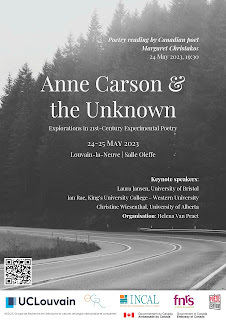 25 May 2023: 11am session: I will be speaking on Anne Carson--as the program says, Jennifer K Dick talk: “De-Stabilizingthe Known / Restauring the Unknown: Reading Anne Carson throughthe Lens of Quantum Physics (and Dark Matter)” at the Anne Carson and the Unknown: Explorations in 21st Century Experimental Poetry Conference. For the entire programme, links to watch online, go to:
25 May 2023: 11am session: I will be speaking on Anne Carson--as the program says, Jennifer K Dick talk: “De-Stabilizingthe Known / Restauring the Unknown: Reading Anne Carson throughthe Lens of Quantum Physics (and Dark Matter)” at the Anne Carson and the Unknown: Explorations in 21st Century Experimental Poetry Conference. For the entire programme, links to watch online, go to:https://uclouvain.be/fr/instituts-recherche/incal/ecr/evenements/anne-carson-and-the-unknown-explorations-in-21st-century-experimental-poetry.html ABSTRACT: Perhaps it is not the unknown in Carson, but rather that one “knows” only in an instant before something changes the outcome: the uncertain, the flux returns—i.e. Schrodinger’s paradox. In this manner, Carson inhabits the transformatory space of scientific theoretical practice, ever striving for deeper knowledge where any response to a question is immediately undermined by another query. As Carson’s own admiration for Jacques Lacan’s declaration reveals: “The reason we go to poetry is not for wisdom, but for the dismantling of wisdom” (Carson/Aitkins interview). I propose to borrow from Kathryn Schaffer and Gabriela Barreto Lemos’s assessment of how quantum physics can provide ideological and theoretical tools for the arts and humanities. I will study select passages from Carson’s books where the vacillating waves of plots intersect with a potential development in consciousness for a character, consciousness related to their being part of, though often felt as outside or left of center, or of events, societies, communities, relationships and most of all a secured, fixed sense of self-understanding (self knowledge).... [truncated abstract here--full version on the conf website]
27th May 2023: starting from 15h30: I will read a text as part of the
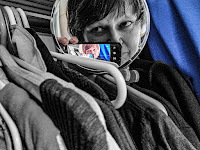
open-forum event organized by the amazing and dynamic author Bénédicte Heim. The theme is about aging, and overall the event will be in French.: Dans le cadre de l'exposition " Faire son âge " qui se tiendra à partir du 24 mai jusqu'à la fin du mois de juin dans la galerie de la Reine Christine, au 12 rue des Patriarches 75005 (métro Censier-Daubenton), paroles, art, etc autour du vieillissement le samedi 27 mai à partir de 15h30.
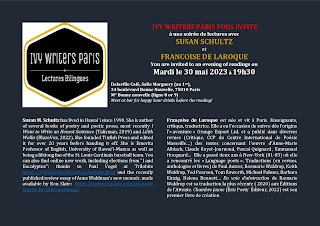 30 May 2023: 19h30 I am hosting the next IVY WRITERS PARIS evening with Susan Schultz and Françoise de LaRoque at Delaville Café, 34 bvd bonne nouvelle. Full info on the Ivy blog at: https://ivywritersparis.blogspot.com/2023/05/ivy-le-30-mai-avec-s-schultz-et-f.html
30 May 2023: 19h30 I am hosting the next IVY WRITERS PARIS evening with Susan Schultz and Françoise de LaRoque at Delaville Café, 34 bvd bonne nouvelle. Full info on the Ivy blog at: https://ivywritersparis.blogspot.com/2023/05/ivy-le-30-mai-avec-s-schultz-et-f.html
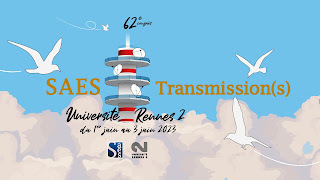 3 juin 2023: 9h30 I am giving another conference presentation: Jennifer K. DICK (Université de Haute-Alsace, Mulhouse) : "Resisting Transmission: Against a poetry of communication?" at the 62nd annual SAES Congrès in RENNES on Transmission(s) in Atelier 14: Poets and Poetry. https://congres2023.saesfrance.org/programme-scientifique/programme-par-atelier/ ABSTRACT:
3 juin 2023: 9h30 I am giving another conference presentation: Jennifer K. DICK (Université de Haute-Alsace, Mulhouse) : "Resisting Transmission: Against a poetry of communication?" at the 62nd annual SAES Congrès in RENNES on Transmission(s) in Atelier 14: Poets and Poetry. https://congres2023.saesfrance.org/programme-scientifique/programme-par-atelier/ ABSTRACT: As the globalized world leans—asif in a kind of anglicized linguistic immigration—towards Twitter andInsta-poetry, to the directive statement and easy access in a kind of all-for-oneEnglish as dominant language, a second poetry and poetics has been slowlyemerging and growing in force: that of the multilingual author. These writers’works might be published as “English” or “American” but their pages are dottedby a wide array of other languages, languages that often absorb, cover, andbury the English. The books I am addressing here are by authors that refuse toself-translate. For some, this poses no real barrier to being interpreted astheir second and third languages share roots with English. But for others,writing in radically different alphabets or where non-bilingual readers willnot be able to grasp the semantic meaning of the words, the “transmission” (ina habitual sense of reading poetry) finds itself at the end of a dead endstreet. In this case, the foreign language(s) often acts as extra-lingualexpression, pushing these works into boundary zones between poetry and visualart or performance, or poetry and music (zaum-like sound poetry practices).
These works are a reckoning and recognition oflinguistic and cultural otherness within perceived unified nations and literarytraditions. As such, exploration and study of these authors provide essentialtools for deeper reflections on notions of transmission of meaning in poetryand literature. They also demand perhaps that we rethink our old definitions ofthe verb “to read”.6 June 2023: 19h30 Back in Paris it is already time for me to host another Ivy night. This one is the final of our spring 2023 season, and will feature visiting American author and translator Cynthia Hogue alongside Paris local authors and translators Vincent Broqua and Virginie Poitrasson. at Delaville Café, 34 bvd bonne nouvelle. A pre-announcement for this is already up on the Ivy blog at https://ivywritersparis.blogspot.com/2023/05/ivy-le-30-mai-avec-s-schultz-et-f.html
February 11, 2023
Jennifer K Dick is Reading Anne Carson through the Lens of Quantum Physics and Dark Matter at this May 2023 conference
I am thrilled to be participating in this very exciting conference on Anne Carson in May. Below you can find the provisional schedule. I am in the final panel before the conference closes.

Anne Carson and the Unknown: Explorations in 21st-Century Experimental Poetry
PROVISIONAL PROGRAMME
24-25 May 2023, UCLouvain, Louvain-la-Neuve, Belgium
“A phenomenologist from Louvain-la-Neuve
is telling us what Heidegger thought during the winter term
of 1935.
There was an interrogation of art.
There was a circle to be made.”
—Anne Carson, Plainwater (2000 [1995], p. 56)
DAY 1: WEDNESDAY 24 MAY 2023
8.30 – 9.00 Registration & coffee
9.00 – 9.15 Conference opening by the Embassy of Canada to Belgium
9.15 – 9.30 Opening remarks
9.30 – 10.15 Keynote by Ian Rae (King’s University College at Western University), “Knowing Collapse: Anne Carson’s ‘The Fall of Rome’”
10.15 – 10.45 Coffee break
10.45 – 12.15 Session 1 (“Reaching Towards Other Selves and Otherness”)
- “Norma Jeane Baker, ‘Harlot of Troy’: Anne Carson’s Unknowable Hellenic Eidolon” – Amanda Kubic (University of Michigan, Ann Arbor)
- “Albertine or the Unknowability of the Other: Carson’s Reading of Proust” – Christina Kkona (Bordeaux-Montaigne University)
- “Poetics of the Caesura” – Elizabeth D. Harvey (University of Toronto)
12.15 – 13.45 Lunch
13.45 – 14.15 Performance by Annabel Wilson (Massey University), “‘Dismantling of Wisdom’: Creative-Critical Responses to Anne Carson’s Nox”
14.15 – 15.45 Session 2 (“Oscillations between Knowing and Sensing”)
- “Anne Carson’s Radical Formalism” – David Fearn (University of Warwick)
- “Anne Carson’s ‘Anarchitecture’ and the Disrupting Potential of Matter in Float” – Helena Van Praet (Université catholique de Louvain)
- “A Montaging of the Senses: The Chor(e)o-Phonographics of Anne Carson’s H of H Playbook” – Annie Felix (University of California, Berkeley)
15.45 – 16.15 Coffee break
16.15 – 17.00 Keynote by Laura Jansen (University of Bristol), “On Not Knowing – Yet”
UCLOUVAIN | LOUVAIN-LA-NEUVE | BELGIUM
Collège Erasme, Place Blaise Pascal, 1 bte L3.03.31, 1348 Louvain-la-Neuve, Belgique
– www.uclouvain.be –https://uclouvain.be/fr/instituts-recherche/incal
17.30 – 19.15 Walking dinner
19.30 – 21.00 Poetry performance by Margaret Christakos
DAY 2: THURSDAY 25 MAY 2023
8.45 – 9.15 Registration & coffee
9.15 – 10.15 Session 3 (“Experiments with Myth and Media”)
- “Tracing the Unknown Herakles in Anne Carson’s H of H Playbook” - Zina Giannopoulou (University of California, Irvine) & Lena Grimm (University of Michigan, Ann Arbor)
- “Re-reading Tragedy with Comics in Carson & Bruno’s The Trojan Women” - Natalie J. Swain (University of Winnipeg)
10.15 – 10.45 Coffee break
10.45 – 12.15 Session 4 (“Towards Critical Epistemologies”)
- “On Carson’s Transparency” – Elizabeth Sarah Coles (Universitat Pompeu Fabra, Barcelona)
- “Dogs Talking: Translation, the Female and the Unintelligible in and between Anne Carson’s Texts” – Theresa Mayer (University of Hildesheim)
- “The ‘Floating’ Gender: Anne Carson’s Autobiography of Red and the Lost Trans Archive” – Mary Mussman (University of California, Berkeley)
12.15 – 13.45 Lunch
13.45 – 14.30 Keynote by Christine Wiesenthal (University of Alberta), “A Poet’s (Unpredictable) Techne Semeiotike”
14.30 – 15.00 Coffee break
15.00 – 16.30 Session 5 (“Exploring Emotions and the Invisible”)
- “Emotional Commitment and Response: Simone White, Anne Carson and Affective Criticism” – Nicholas Vila Byers (University of California, Berkeley)
- “De-Stabilizing the Known / Restauring the Unknown: Reading Anne Carson through the Lens of Quantum Physics and Dark Matter” – Jennifer K Dick (Université de Haute Alsace)
- “‘That Emptiness Where God Would Be’: Anne Carson and the Postsecular” – Kyra Sutton (University of California, Berkeley)
16.30 – 17.00 Concluding remarks
Coordinating committee:
- Ben De Bruyn, Professeur (UCLouvain)
- Michel Delville, Professeur ordinaire (ULiège)
- Stéphanie Vanasten, Professeure (UCLouvain)
- Helena Van Praet, Assistante (UCLouvain)
UCLOUVAIN | LOUVAIN-LA-NEUVE | BELGIUM
Collège Erasme, Place Blaise Pascal, 1 bte L3.03.31, 1348 Louvain-la-Neuve, Belgique
– www.uclouvain.be – https://uclouvain.be/fr/instituts-rec... - https://uclouvain.be/fr/institutsrech...
incal/ecr
Scientific committee:
- Jan Baetens, Professeur émérite (KU Leuven)
- Ben De Bruyn, Professeur (UCLouvain)
- Michel Delville, Professeur ordinaire (ULiège)
- Bart Eeckhout, Professeur ordinaire (University of Antwerp)
- Bertrand Gervais, Professeur titulaire (Université du Québec à Montréal)
- Laura Jansen, Associate Professor (University of Bristol)
- Stéphanie Vanasten, Professeure (UCLouvain)
- Helena Van Praet, Assistante (UCLouvain)
Organised in association with and the support of NEDLIT (Groupe de Recherche en littératures et cultures de langue néerlandaise et comparées), ECR (Centre de recherche écriture, création, représentation), and INCAL (Institut des civilisations, arts et lettres) at the UCLouvain, Louvain-la-Neuve, Belgium.
Organised in collaboration with Poëziecentrum, Ghent, Belgium.
With the support of the Fund for Scientific Research (F.R.S.–FNRS) and the Embassy of Canada to Belgium.
Contact: annecarsonconference2023 [at] uclouvain.be
Website:
https://uclouvain.be/fr/instituts-recherche/incal/ecr/evenements/anne-carson-and-the-unknown-explorations-in-21st-century-experimental-poetry.html
January 28, 2023
Reading for Estepa Editions at Red Wheelbarrow on 29 Jan 2023
January 23, 2023
Upcoming Events: where to find Jennifer K Dick and many other, exciting authors!
I am in busy mode as we settle into 2023. Here are a few places you can find me:
STRASBOURG 28 January 2023:
SWAS: Strasbourg Write A Story: Fiction Writing Workshop "MYSTERY" with Jennifer K Dick on 28th January 2023 14-16h. http://sxb-write-a-story.org/workshops-2022-23-new/
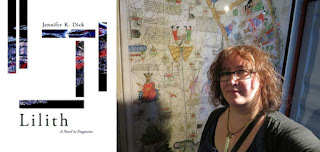 Course Description: The Mysteries that Surround Us — This generative writing workshop with Jennifer K Dick will be based around “mystery”. Not the genre, but instead the mysteries that surround us every day and which provide a million opportunities for us to encounter and make stories. As such, this workshop will focus on where to find a story, questions of what plot is and why it might or might not matter to story writing (for you) and how to use questions to find characters and their motivations. Finally, our afternoon together will close with some tips on how to hone and polish your story. The goal is to encounter a little of the unknown together, to write something into being, and to leave perhaps not with more knowns, but rather with more mysteries to explore on our own as we continue to uncover, craft and polish our own fiction. Please come with the necessary materials to write in situ and an openness to discover and encounter the mysteries of your own inner universes.YOU CAN ALSO SUBMIT YOUR STORIES TO THE 2023 SWAS CONTEST, NOW OPEN.
Course Description: The Mysteries that Surround Us — This generative writing workshop with Jennifer K Dick will be based around “mystery”. Not the genre, but instead the mysteries that surround us every day and which provide a million opportunities for us to encounter and make stories. As such, this workshop will focus on where to find a story, questions of what plot is and why it might or might not matter to story writing (for you) and how to use questions to find characters and their motivations. Finally, our afternoon together will close with some tips on how to hone and polish your story. The goal is to encounter a little of the unknown together, to write something into being, and to leave perhaps not with more knowns, but rather with more mysteries to explore on our own as we continue to uncover, craft and polish our own fiction. Please come with the necessary materials to write in situ and an openness to discover and encounter the mysteries of your own inner universes.YOU CAN ALSO SUBMIT YOUR STORIES TO THE 2023 SWAS CONTEST, NOW OPEN. PARIS 29th, 30th and 31st January 2023:
RED WHEELBARROW EVENT at 16 for Estepa Editions with Lisa Pasold, Barbara Beck, Jennifer K Dick and Michelle Noteboom along with Kate Van Houten, publisher, author and visual artist who founded and publishes Estepa Editions artbooks. This will be a wonderful reading to support an amazing art book publisher. You can also pick up copies of books by the authors published by other publishers and get those signed. A great way to keep a local bookstore thriving!
IVY WRITERS PARIS mcing for the soirée bilingue with Marielle Anselmo, Jason Stoneking and William Strangmeyer who will be reading Tuesday the 31st of January at 19h30! Full information for that will be up soon at: https://ivywritersparis.blogspot.com/ This event starts at 19h30 but come along a little bit early and get a beer or a cocktail on happy hour and chat with the writers in the gorgeous setting of Delaville Café.
October 12, 2022
Jennifer K Dick speaking at Citizenship Across Borders on Oct 20th 2022
I am thrilled to announce that I will be giving a talk at the CITIZENSHIP ACROSS BORDERS conference in Strasbourg at the Palais Universitaire Salle Pasteur (full programme for anyone interested in attending below). I will be speaking in Panel 1 Citizenship as a construction: Language, Literature and Perceptions at 13h30. My talk is titled: " Under Flag: Language and (Unattainable) Homogenization in the Era of Postnational Citizenship" and it is about the multilingual writings and performances of Theresa Hak Kyung Cha, Craig Santos Perez, Bhanu Kapil and Myung Mi Kim.

Abstract for my talk;
As definitions of nationality and citizenship develop and change, one of the unifying methods of assembling a people under one flag has continued to be language. Language tests have become a component of Nationality exams in France and other European States. Perception of poor reading or writing skills in the language of the country one is attempting to officially migrate into has even lead to the revocation of temporary asylum and national status. Defining nation and citizen based on language is even more highly problematic within the USA, where there has never been an official National Language. This talk will explore how this complex, highly fallacious method of calling a people a people, unified under the umbrella of language, has been radically deplored and deftly criticized within later 20thcentury and early 21st century experimental poetry and poetics, especially in the writings of marginalized and immigrant populations of the United States, from immigrants Theresa Hak Kyung Cha's and Myung Mi Kim’s books to USA native of Guam, Craig Santos Perez’s 4-book cycle from Unincorporated Territory. These authors, like Bhanu Kapil who I will also speak about, in inspiring, emblematic works, have quietly been lobbying through marginalized, often invisible poetic practices for non-binary existences, for new ways to say “I belong”, “I am here”, methods of recognizing the root relationship between language (as spoken and written) in attaining a post-national state of citizenship.
These works are a reckoning and recognition of linguistic and cultural otherness within perceived unified nations. As such, exploration and study of these authors provide essential tools for deeper reflections on notions of citizenship and nationality in our increasingly globalized world.
Organized by
University of Strasbourg – Syracuse University
Maxwell School of Citizenship and Public Affairs of Syracuse University
Université de Strasbourg, DRES National Centre for Scientific Research UMR 7354
Syracuse Abroad and the Syracuse Strasbourg Center
20-21 October 2022
Strasbourg
October 20th Thursday
Université de Strasbourg, Palais Universitaire, Salle Pasteur
9h00-9h15 Welcome in the Aula of the University Palace
9h30 Opening: Carol Faulkner / Samim Akgönül
Welcome address: Erika Wilkens (Syracuse Abroad) / Vincente Fortier (DRES research center)
Raymond Bach (Syracuse Strasbourg Center)
10h45
Keynote: Elizabeth Cohen, Syracuse University: Citizenship Across Generations
12h00 Lunch break sponsored by DRES Research Center
Restaurant « la Victoire », 24 Quai des Pêcheurs, 67000 Strasbourg
13h30 Panel 1
Citizenship as a construction: Language, Literature and Perceptions
Chair: Samim Akgönül
Dympna Callaghan, Syracuse University: “Poor citizen, distressed”: Shakespeare and the Citizen
Jennifer K. Dick, University of Haute Alsace: Under Flag: Language and (Unattainable) Homogenization in the Era of Postnational Citizenship
Subhasree Ghosh, University of Calcutta, From Subjects to Citizens: ‘Constructing’ Citizenship in Post-Colonial India, 1947-1955
15h00-15h15 Coffee Break
15h15 Panel 2
Post-ottoman nationhood and citizenship
Chair: Seth Jolly
Samim Akgӧnül, University of Strasbourg: Why immigrants vote? External vote of Turks in Europe and loyalty concerns
Yunus Sözen, LeMoyne College: Pro-immigration Right-Wing Authoritarian Populism: Redefining Nation and Citizenship in Turkey
Inci Öykü Yener-Roderburg, University of Essen-Duisburg: Non-voter remote refugee partisanship: Evidence from the non-voter Kurds for the Turkish Elections in Germany
16h45-17h00 coffee break
17h00 Panel 3
Legal citizenship: roots and mutations
Chair: John J. Goodman
Chris R. Kyle, Syracuse University: Birthright Naturalization Law: An English Historical Perspective
Andres Sanchez-Padilla, Centro Universitario de la Defensa de Zaragoza: Defining the Rules of Naturalization: Sovereignty, Citizenship, and U.S.-Spanish Relations (1868-1884)
Dalia Abdelhady, Lund University, and Amy Lutz, Syracuse University: Lived Citizenship among the Children of North African Immigrants
18h30 Break before Dinner
19h30 Conference dinner sponsored by the Maxwell School,
Restaurant “Au pont Saint Martin” 15 Rue des Moulins, 67000 Strasbourg
October 21st Friday
Syracuse University Strasbourg Center, Room 202/203
19 Quai Rouget de Lisle
8h30-9h00 Welcome and coffee
9h00 Panel 4
Challenges of Immigration between Africa and Europe
Chair: Mary Boyington
Seth Jolly, Syracuse University: Immigration as the Key Structuring Issue of Party Politics in Europe
Kishauna Soljour, San Diego State University: Afrique Sur Seine: Sub-Saharan African Migration and Acculturation in France
John Goodman, Syracuse University Strasbourg Center: Citizenship as a Mirage: Diplomatic Challenges and Suspended Citizenship in the Sahel
10h30-10h045 coffee break
10h45 Panel 5
Citizenship and identity: Gender and Social Movements
Chair: Carol Faulkner
Azra Hromadžić, Syracuse University: A City in Love with the River in Bosnia and Herzegovina
Debora Spini, Syracuse University Florence Center: “My Indianness is my religion”: inclusive citizenship and the women protest of Shaheen Bagh, New Delhi
Dagmar Wernitznig, University of Ljubijana: Citizenship, Gender, and Post-War Transitions: Historiographical Case Studies of Alien Women
12h30 Lunch break sponsored by Syracuse Abroad
Restaurant Le Jasmin 1 Rue Schimper, 67000 Strasbourg
14h00 Round table and debate
And then what? New nationalism in Post-national era
With Hélène Quanquin, University of Lille; Carol Faulkner, Syracuse University; Samim Akgönül, University of Strasbourg; Elizabeth Cohen, Syracuse University
16h00 End of the conference and free time in Strasbourg
June 26, 2022
Paris Writers' Workshop 2022 with WICE this week reading at Red Wheelbarrow
This week of the WICE Paris Writers' Workshop has events for participants and for the public. Don't miss out on the special opportunities that the workshop offers, and please join me both for the FREE AND OPEN TO THE PUBLIC READING at the Red Wheelbarrow Bookstore on Thursday night at 6p and for the FREE PANEL TALK Friday evening at FORUM 104, 65006 Paris.
POETRY MASTER CLASS with JENNIFER K DICK:

READING: FREE TO ALL
30 June—6pm: WICE Paris Writers’ Workshop Faculty & Student Reading at Red Wheelbarrow with Jennifer K Dick (poetry), Lauren Groff (novel), Alecia McKenzie (short story) & Jeffrey Greene (creative nonfiction). These faculty members will be reading at 6pm Thursday the 30th of June and presenting some of their PWW participant workshoppers who will share work, too!
 PANEL TALK JULY 1 2022 4pm-6pm: to close this fabulous week on writing in Paris. Please join us for this conversation on WRITING IN PARIS: MIGRATION AND THE ARTS with CRAIG CARLSON, JENNIFER K DICK, MATT JONES and JAKE LAMAR, moderated by KATHLEEN CHURCHILL. Open to the public, but REGISTRATION REQUIRED via the WICE PWW website:
PANEL TALK JULY 1 2022 4pm-6pm: to close this fabulous week on writing in Paris. Please join us for this conversation on WRITING IN PARIS: MIGRATION AND THE ARTS with CRAIG CARLSON, JENNIFER K DICK, MATT JONES and JAKE LAMAR, moderated by KATHLEEN CHURCHILL. Open to the public, but REGISTRATION REQUIRED via the WICE PWW website: 
June 13, 2022
RED WHEELBARROW READING the 19th of June 2022 at 3pm
READING THE 19TH OF JUNE AT 3PM
AT THE RED WHEELBARROW:
ALEXANDER DICKOW
JENNIFER K DICK
BISWAMIT DWIBEDY
& LAURA MULLEN

The Red Wheelbarrow
9 & 11 rue de Medici
75006 Paris
M° Odéon, Cluny or RER B Luxembourg
BIOS:
Alexander Dickow is the author of 8 books—most recently Le premier souper (La Volte, 2021) & The Appetites(Madhat, Inc, 2018). He writes with equal versatility in both English & French as well as in a combination of the two. He has also translated 2 books & edited 2 critical volumes. For more, see: https://www.alexdickow.net/
Jennifer K Dick is the author of 4 collections of poetry & 6 chap/artbooks. She directs the department of English at Université de Haute Alsace, France. She will be reading from That Which I Touch Has No Name (Black Spring Press Group, 2022) & artbooks from Estepa Editions, France. For more, see https://jenniferkdick.blogspot.com
Biswamit Dwibedy is the author of 6 collections of poetry published in India & the United States, including Hubble Gardener (Spuyten Duyvil, 2018). He is the founder & editor of Anew Print, a small press that publishes limited-edition chapbooks from writers in India & abroad, & he edited selections of Indian poetry in translation from 7 different regional languages for Aufgabe in 2015. He teaches at The American University of Paris.
Laura Mullen is the author of 8 books of poetry (most recently Complicated Grief, Solid Objects 2015). Her translations from the French include Hero by Véronique Pittolo (Black Square Editions, 2018). Mullen is currently the Kenan Professor of the Humanities in Creative Writing at Wake Forest University’s Department of English. She will be reading recent translations alongside the French. For more see: https://www.lauramullen.biz/
Jennifer K. Dick's Blog
- Jennifer K. Dick's profile
- 7 followers




